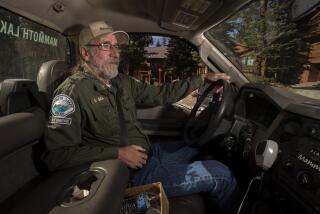Cree Laments Loss of Survival Skills
CHISASIBI, Canada — Job Bearskin, 77, says he remembers his first kill as if it were a dream. It was a silver fish. He caught it through a hole in the ice. His parents had tied the fishing line to his arm so he would not drop it into the water. He was very young.
Success on a boy’s first hunt was thought to portend a life of good hunting, said Bearskin, one of the most respected of the Cree elders. A piece of flesh torn from a boy’s first kill was thrown into the fire as an offering to nature.
Bearskin spoke in Cree and a friend interpreted. Unlike the young men and women of the tribe, he speaks no English.
By the time Bearskin was 10, he knew how to survive alone in the wilderness. He could kill a caribou and trap a beaver. He could make snowshoes and toboggans and fishing nets. A Cree child had to know how to survive, he said, because a father might go into the bush after polar bear and never return to the warmth of his lodge.
The Cree can still hunt, but they cannot do it as a way of life, Bearskin said. The young men work for money and do not spend enough time in the bush. Their skills are not sharp. Bearskin’s 30-year-old grandson, George, can kill an animal, but he is not a hunter.
You learn to hunt by apprenticeship, Bearskin said. How much you learn is limited by what your teacher knows. The young children growing up now are learning to hunt from people who do not know what it is to be a hunter. It is a sad thing to see.
In his old age, Bearskin should be teaching the young men. Instead, he describes the old ways to journalists and to anthropologists who will preserve his words on paper. He tells them he is grateful that they listen.
More to Read
Sign up for Essential California
The most important California stories and recommendations in your inbox every morning.
You may occasionally receive promotional content from the Los Angeles Times.







